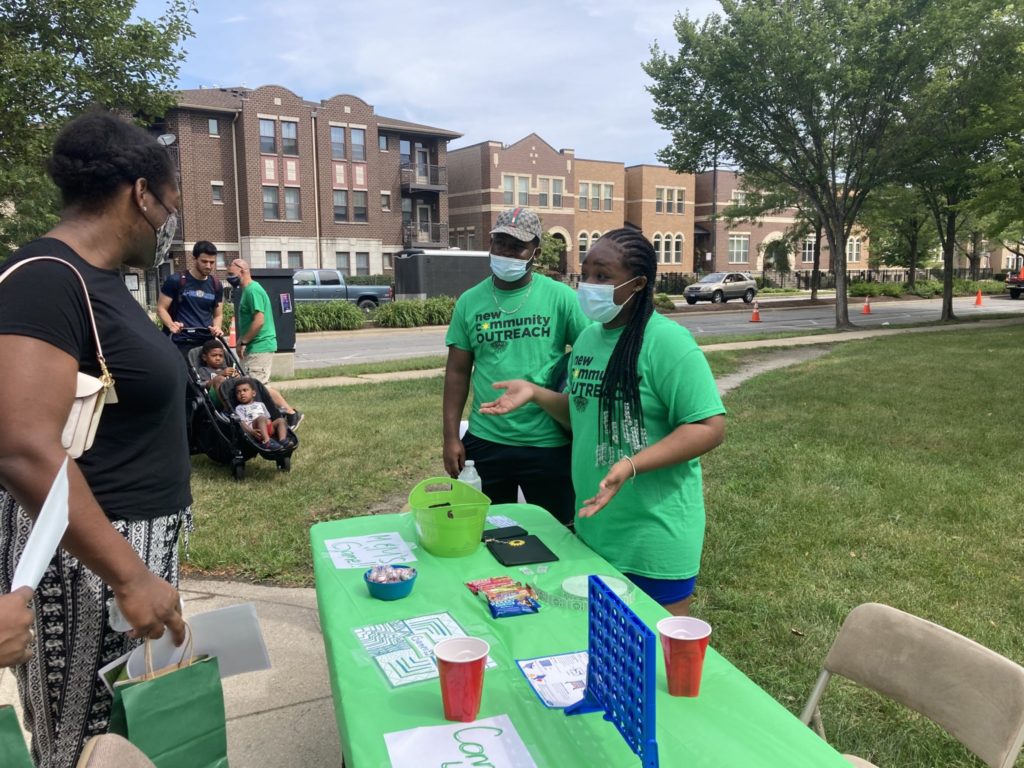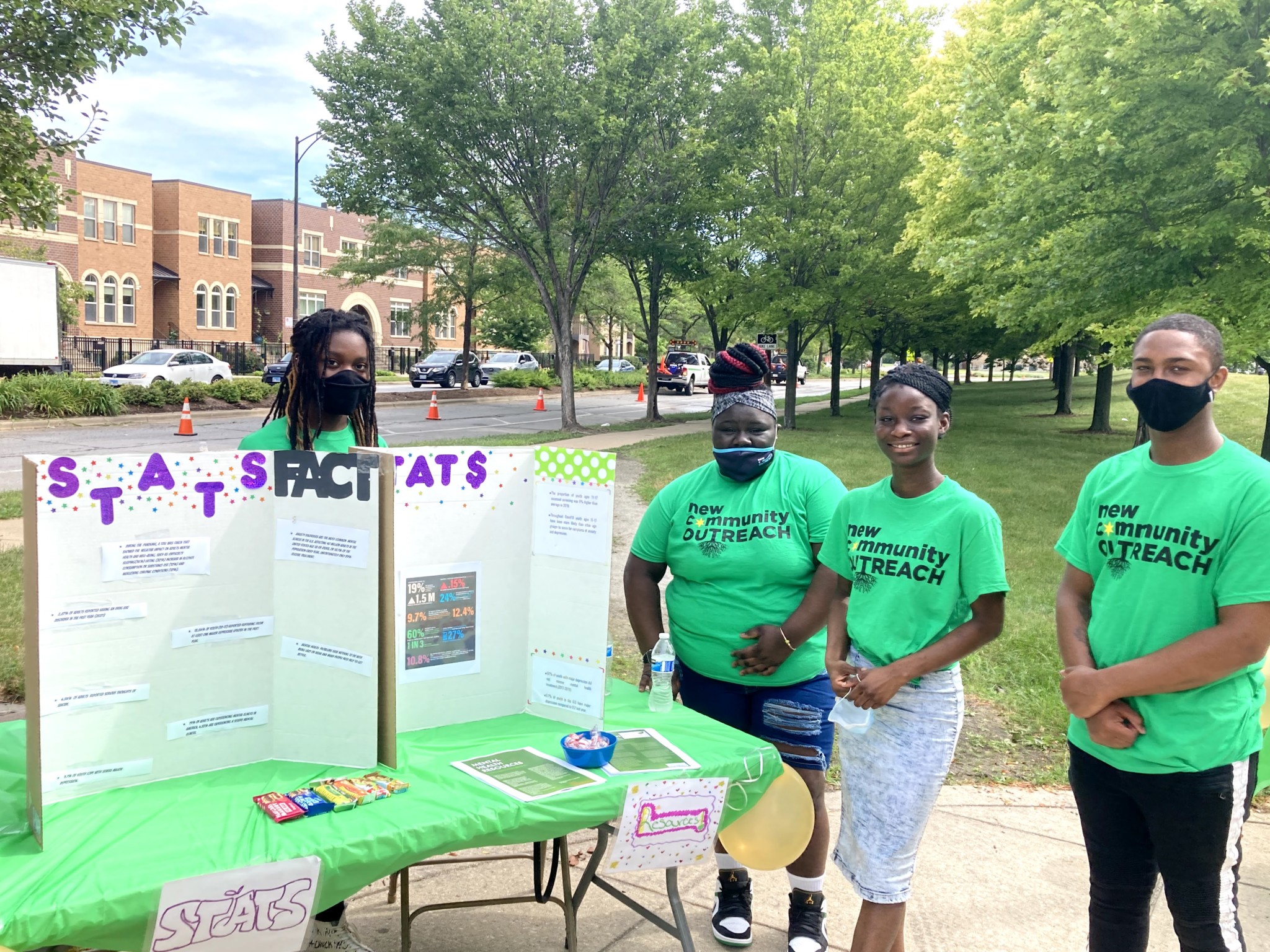Jacinta Merritt, a junior at Walter H. Dyett High School, joined New Community Outreach’s youth leadership program two years ago despite her skepticism. An introvert who struggled with social anxiety, Merritt didn’t see herself as a leader.
“I really didn’t want to get into it because it wasn’t my sort of thing,” Merritt said. “But I realized as time went by, we are the future.”
Merritt is one of twelve South Side students in New Community Outreach’s 2021 Summer Leadership Program, which works with Walter H. Dyett and Daniel Hale Williams high school students to reduce physical and emotional trauma in greater Bronzeville using restorative justice practices. The seven-week program culminated in mid-August with a mental health resource event organized entirely by the students.
“Unfortunately, the reality is that [during] Chicago summers, often we see more violence,” said Sonia Wang, executive director of New Community Outreach (NCO), a nonprofit born out of New Community Covenant Church in Bronzeville. “It continues to be a notion of how do we provide students with safe spaces, and how do we provide them continual growth as leaders?”
The program teaches students to communicate using restorative justice circles, a process originating from Indigenous communities in which participants equally discuss harms, needs, obligations, and other necessary thoughts and feelings.
Wang facilitates as a circle keeper, but students lead the discussions. “Circle is the foundation of our program and serves as the process by which we grow,” Wang said in an email. “Activities can include guest speakers, art activities, experiential learning, and so on, but as we do all of that, we are also engaging in circles to dialogue and process.”
NCO’s restorative justice approach is part of a larger shift to restorative practices within Chicago Public Schools (CPS). Over the past months, more than thirty CPS Local School Councils voted to remove one or both of their two in-school police officers in an effort to reimagine school safety. For each officer removed, schools receive anywhere from $50,000 to $75,000 in funding to be used for policing alternatives, such as peace rooms, peace circles and the hiring of restorative justice coordinators.
This summer, NCO’s student cohort used restorative justice circles to choose a community-based issue to address. Rather than deferring to majority rule, circles require all students to discuss their ideas until they reach a consensus.
“It’s amazing what can happen when there’s intentional time to really consider these sorts of topics,” Wang said. “And it’s also amazing how our young people are just so brilliant when given the opportunity to really digest these concepts.”
Divided on which social issue to address, the students struggled at first to come to an agreement. “The number of times we had to go through and be like, okay where are we at now?” Wang said. “It’s time consuming, which is hard, right? Especially in a society where we’re always on the go. But that’s something we value.”
After a few weeks of circle discussions, the students finally agreed on a topic: mental health.
“It was very tedious at one point,” said Trinity Johnson, a junior at Dyett. “But we got through it, and we came to a consensus on this idea. It was definitely, definitely worth it.”
The students then developed a mental health resource event to help Bronzeville residents access help for depression, anxiety and other mental illnesses.“Mental health is important to address because a lot of people don’t think it applies to them,” said Mia Coleman, a junior at Dyett. “I think a lot of people struggle with mental health because of job resources. They don’t have access to jobs or homes.”
On Thursday, August 12, the students set up tables in Bronzeville’s Mandrake Park with snacks, games and prizes, open to people of all ages. Forty community members came to the event, and students handed out resource guides with information about local agencies providing counseling, housing and job support, rehab, food and more.
“The home I grew up in, mental health is not known,” said Favour Olatunde, a 2021 Daniel Hale Williams graduate. “People don’t talk about it, especially youth. And during the pandemic, a lot of people have been struggling with it. So this is just a way to make people know that they’re not alone.”
According to Lurie Children’s Hospital, forty-four percent of Chicago children experienced an increase in mental or behavioral health symptoms during the pandemic. The Collaborative for Community Wellness’ (CCW) 2021 citywide mental health needs survey found an “overwhelming demand” for mental health services in Chicago. Nearly ninety percent of survey respondents said if there was a free city-run mental health clinic in their neighborhood, they would probably go.
Bronzeville is beginning to put its demands for mental health services into action. Last November, Bronzeville residents overwhelmingly approved a property tax increase to fund free mental health services in the neighborhood.
Bright Star Community Outreach, a local community-based organization founded in 2009, offers free trauma support to help people struggling with abuse, depression and other mental health issues. The organization’s trauma helpline has helped about 45,000 community members to date.
“It is not a lack of interest that stops community residents from seeking mental health services,” CCW’s report states. “Instead, community residents are unable to seek out services due mostly to structural barriers.”
In addition to high costs, many residents can’t access mental health services simply because they do not know where to go. The Chicago Department of Public Health runs five mental health centers, one of which is in Bronzeville. Yet seventy-three percent of CCW’s survey respondents across the city said they did not know about these centers.
“There’s a lot of violence and things like that that have been happening,” said Jonathan Norman, a senior at Dyett. “People don’t know where to go and how to cope with these things. You see people going kind of nuts because it’s a recurring cycle with mental health. So we just want to provide resources, and tell them where to go and how to cope with these things, even if they don’t want to talk to somebody.”
The students’ project not only shed light on how to access mental health services, it also empowered Bronzeville youth to become proactive in their community.
“I’ve realized that we can’t just talk about something. Some action has to be done,” Merritt said as she oversaw the game table at the resource event. “We’ve been talking about this event for weeks and weeks now, so to finally have it open for everyone in this area is amazing.”
In addition to growing as leaders, students also grew in confidence.
“Some of my shyness and nervousness have gone down in this program,” Merritt said. “This, right now—talking, eye contact—I couldn’t do this two years ago.”

Coleman joined the program to boost her self-esteem and find a voice for the youth. “I know a lot of youths don’t like speaking up because of self-esteem and because of that low confidence of what they think the world has to say,” Coleman said, “but the youths have to stand up for our generation.”
Gionna Shack, a junior at Dyett, agreed with Coleman. “At first I didn’t really believe I could become a change agent,” Shack said, “but after doing this program and seeing the issues in our community, I feel like I can do anything.”
Kelsey Turner is a freelance journalist and investigative journalism student at Northwestern University’s Medill School of Journalism. This is their first story for the Weekly.

